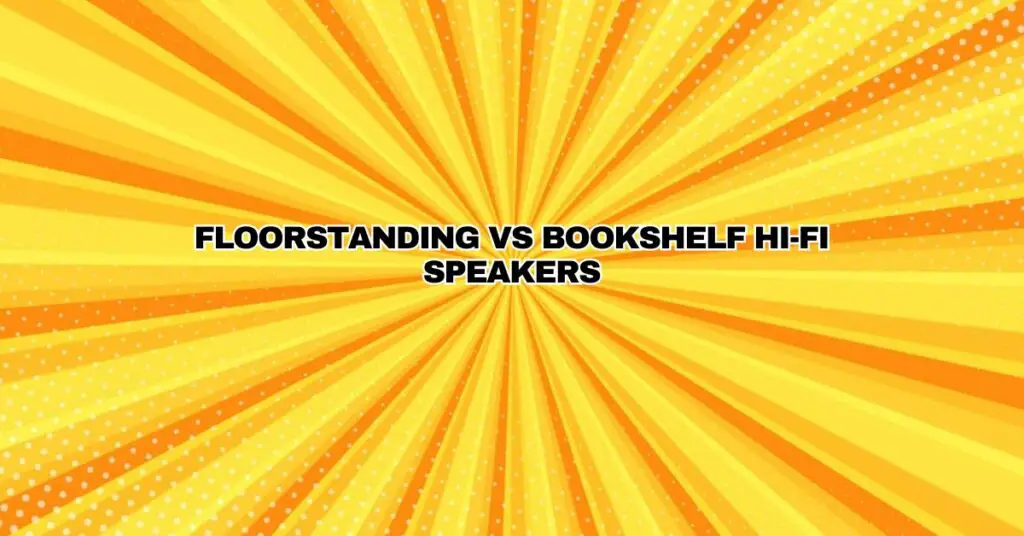Choosing the right Hi-Fi speakers is a crucial decision for audiophiles and music enthusiasts, as it significantly impacts the audio quality and overall listening experience. Two popular options that often come into consideration are floorstanding and bookshelf speakers. These two types of speakers have their unique characteristics and excel in different aspects. In this comprehensive comparison, we will delve into the features, advantages, and limitations of floorstanding and bookshelf Hi-Fi speakers to help you make an informed decision for your audio setup.
Floorstanding Hi-Fi Speakers:
Advantages:
- Wider Frequency Range: Floorstanding Hi-Fi speakers are renowned for their ability to reproduce a vast spectrum of frequencies, from deep bass to crisp treble. This results in a more comprehensive and immersive listening experience, making them suitable for audiophiles who appreciate full-frequency sound.
- Enhanced Bass Response: The larger cabinet size and multiple woofers in floorstanders provide deeper and more impactful bass. This is particularly appealing for music genres and recordings that rely on a strong bass presence, such as rock, jazz, and electronic music.
- Improved Midrange: Floorstanding Hi-Fi speakers often feature dedicated midrange drivers that offer superior clarity and detail within this critical frequency range. This results in a more engaging and lifelike sound.
- Cleaner Sound: The increased cabinet size and superior construction quality of floorstanding speakers help reduce cabinet resonance and vibrations, resulting in cleaner, more transparent sound reproduction.
- Higher Power Handling: Floorstanding Hi-Fi speakers can typically handle more power without distortion, making them suitable for both moderate and high-volume listening.
Considerations:
- Room Size: Due to their size and sound output capabilities, floorstanding speakers are best suited for larger listening spaces. In smaller rooms, they can produce an overwhelming sound.
- Amplification: It’s essential to ensure that your amplifier or receiver can provide sufficient power to drive floorstanding speakers effectively. An underpowered amplifier can limit their performance.
- Budget: Floorstanding Hi-Fi speakers come in a wide price range, so it’s important to establish a budget that aligns with your needs and preferences.
Bookshelf Hi-Fi Speakers:
Advantages:
- Space Efficiency: Bookshelf Hi-Fi speakers are compact and perfect for smaller rooms or setups with limited floor space. Their smaller footprint allows for versatile placement options.
- Flexibility: Due to their smaller size, bookshelf speakers offer flexibility in placement. They can be used on bookshelves, stands, or as rear-channel speakers in home theater systems.
- Quality Sound in Small Rooms: In smaller rooms, bookshelf Hi-Fi speakers can provide exceptional sound quality. They are particularly effective when paired with a subwoofer for enhanced bass response.
- Budget-Friendly: Bookshelf Hi-Fi speakers come in a wide range of prices, making them accessible to various budgets.
Considerations:
- Limited Bass Output: Bookshelf Hi-Fi speakers generally have limitations in deep bass reproduction due to their smaller cabinet size. While they can be paired with a subwoofer for added bass, dedicated audiophiles may prefer the richer bass of floorstanding speakers.
- Amplification: It’s crucial to ensure that your amplifier or receiver can drive the chosen bookshelf Hi-Fi speakers efficiently, taking into account their power requirements and impedance.
- Listening Distance: Consider the distance from which you will be listening. If you are too far from bookshelf Hi-Fi speakers, you may not fully appreciate the details in the sound.
Making the Right Choice:
Selecting between floorstanding and bookshelf Hi-Fi speakers involves several crucial factors:
- Room Size: The size of your listening room plays a significant role in determining the suitability of your speakers. Larger rooms often benefit from the fuller sound and enhanced bass of floorstanding speakers, while bookshelf speakers are more versatile in smaller spaces.
- Listening Preferences: Think about your musical and audio preferences. If you enjoy deep bass and immersive sound, floorstanders might be the better choice. If you prioritize space efficiency and have a smaller room, bookshelf speakers are an excellent option.
- Budget: Determine your budget for speakers and any associated equipment, such as amplifiers and subwoofers. Both floorstanding and bookshelf Hi-Fi speakers offer options at various price points.
- Room Acoustics: Proper room treatment can significantly enhance the performance of your chosen speakers by minimizing room reflections and improving sound clarity.
- Music Genres: Consider the types of music you listen to most frequently. Different genres have distinct sound characteristics, and your choice of speakers should complement your music preferences.
In Conclusion:
The decision to choose between floorstanding and bookshelf Hi-Fi speakers is not a one-size-fits-all choice. The right decision depends on your specific needs and preferences. Floorstanding Hi-Fi speakers offer a broader frequency range, powerful bass, and enhanced midrange, making them suitable for larger rooms and a wide range of music genres. Bookshelf Hi-Fi speakers, on the other hand, excel in compact spaces, providing flexibility in placement and an array of options to fit various budgets.
Ultimately, the “better” speaker choice is subjective and hinges on your listening environment, habits, and personal taste. Both types have their own set of advantages and limitations, and the right choice is the one that aligns with your specific requirements and allows you to enjoy your music and audio content to the fullest.


